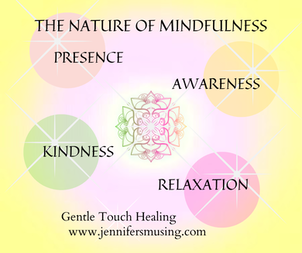THE NATURE OF MINDFULNESS
The nature of mindfulness is conscious, deliberate, empowering, and present. It's a process of unfolding in more organic ways that help us feel more authentic. Practicing mindfulness is a form of self-intimacy. It is a vehicle for self-discovery and an inner exploration that leads one to deeper states of self-connection and alignment.
In order to understand the function of practicing mindfulness we have to differentiate what mindfulness is and what it is not. Some equate mindfulness simply with the concept of awareness. However, there is a difference. In a state of mindfulness, we learn to acknowledge what is present, moment to moment, without judgment and allow a place of surrender to states of observation.
In order to understand the function of practicing mindfulness we have to differentiate what mindfulness is and what it is not. Some equate mindfulness simply with the concept of awareness. However, there is a difference. In a state of mindfulness, we learn to acknowledge what is present, moment to moment, without judgment and allow a place of surrender to states of observation.
WHAT MINDFULNESS IS
1. Becoming more aware
2. Being intentional
3. Participating fully
4. Staying present in each moment
1. Becoming more aware
2. Being intentional
3. Participating fully
4. Staying present in each moment
WHAT MINDFULNESS IS NOT
1. Meditation (but helps us to be more mindful)
2. Escape from reality
3. "Getting it all together"
4. Being passive or non-emotional
1. Meditation (but helps us to be more mindful)
2. Escape from reality
3. "Getting it all together"
4. Being passive or non-emotional
Now that we know what mindfulness is and what it is not, we can break the skills down into two sections, "What" skills and “How” skills.
What are the Mindfulness Skills and How do we use them in Healthy and more Effective ways?
There are two types of Mindfulness skills
1. "What" Skills
2. "How" Skills
There are two types of Mindfulness skills
1. "What" Skills
2. "How" Skills
MINDFULNESS "WHAT" SKILLS
1. Observe
2. Describe
3. Participate
"What" skills teach how to practice and apply mindfulness skills
1. Observing is simply noticing without putting any words to it.
2. Describing is putting words on the experience.
3. Participation is being totally present and fully alive in the experience. This includes also noticing when there may be resistance, avoidance, or protections to your ability to participate or lack thereof.
1. Observe
2. Describe
3. Participate
"What" skills teach how to practice and apply mindfulness skills
1. Observing is simply noticing without putting any words to it.
2. Describing is putting words on the experience.
3. Participation is being totally present and fully alive in the experience. This includes also noticing when there may be resistance, avoidance, or protections to your ability to participate or lack thereof.
MINDFULNESS "HOW" SKILLS
1. Non-judgmentally
2. One-Mindfully
3. Effectiveness
"How" skills help facilitate awareness in those areas that might be blocking the capacity of being more mindful. They also assist in discerning effectiveness in navigating experiences in healthier more intentional ways.
1. Non-judgement allows the experience to be as it is. We learn to practice staying neutral, lessening the experience of inner-conflict.
2. One-mindfully is being fully present to the moment, not lost in the past or thinking about the future. It's doing one thing at a time, with full awareness, rather than splitting your attention between things.
3. Effectiveness is about learning how to be effective in our approach to our lives. Doing what works for you rather than thinking in black and white terms, i.e., right/wrong, good/bad, positive/negative.
1. Non-judgmentally
2. One-Mindfully
3. Effectiveness
"How" skills help facilitate awareness in those areas that might be blocking the capacity of being more mindful. They also assist in discerning effectiveness in navigating experiences in healthier more intentional ways.
1. Non-judgement allows the experience to be as it is. We learn to practice staying neutral, lessening the experience of inner-conflict.
2. One-mindfully is being fully present to the moment, not lost in the past or thinking about the future. It's doing one thing at a time, with full awareness, rather than splitting your attention between things.
3. Effectiveness is about learning how to be effective in our approach to our lives. Doing what works for you rather than thinking in black and white terms, i.e., right/wrong, good/bad, positive/negative.
Learning the "what" and "how" to mindfulness is an essential foundational life tool and with continued practice, can change your life.
Love,
Jennifer
Gentle Touch Healing
Healing through Compassion
Mindfulness Skills, The Nature of Mindfulness, 9.11.2022
- Emotional Wellness Coaching
MORE ABOUT EMOTIONAL WELLNESS COACHING HERE>>
Jennifer
Gentle Touch Healing
Healing through Compassion
Mindfulness Skills, The Nature of Mindfulness, 9.11.2022
- Emotional Wellness Coaching
MORE ABOUT EMOTIONAL WELLNESS COACHING HERE>>
Proudly powered by Weebly

